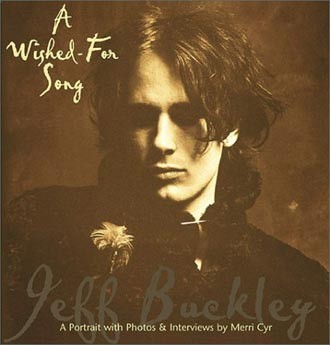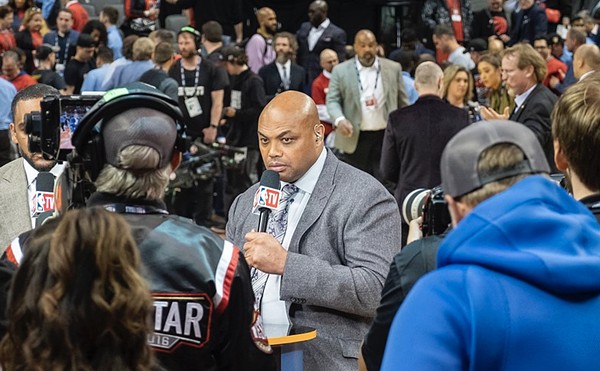| A WISHED-FOR SONG: A PORTRAIT OF JEFF BUCKLEY. Photographed by Merri Cyr. Hal Leonard Publishing Corporation, $30.00, 160 pages. ISBN: 0634035959 |
Guibert has continued the risky task of keeping Buckley in the sales bins and on the Web, inspiring some deserved criticism along the way. When Buckley passed, Guibert immediately set to assembling the unfinished studio noodlings that made up Sketches for My Sweetheart the Drunk, the poorly-received follow-up to Grace (after all, it was comprised mostly of songs rejected by Buckley himself). She also immediately took to manning JeffBuckley.com, where she maintains an awkwardly maternal presence over curious fans. Motherly links like "Birthday Celebrations" and "The Golden Promise" (some superfluous society created to encourage "random acts of kindness and senseless acts of beauty") dominate, while Guibert herself answers purported fan questions on the subject of Jeff's upcoming output. Is it a coincidence that Nino Angelico from Portugal is inquiring about both Buckley's unreleased EPs and his early recordings with Captain Beefheart's Gary Lucas, as they are both being overseen and released by Guibert this fall as The Grace EPs and Songs to No One 1991-1992? Are supply and demand ever that close?
At the root of Guibert's actions is the overriding (and presumably unchallengeable) sense that the fans deserve to hear the music, and that she is something of a missionary for his message. The problem is, Jeff probably would have hated all of this.
A new book released this month, A Wished-For Song, thankfully attempts to eulogize Buckley with the same distant cool of his music: tortured, beautiful, and maybe a little intentionally sepia-toned. (It apparently wasn't overseen by Guibert, so she doesn't list it on the Web site.) Far from being the standard tell-all biography, the book aims to capture the essence of the burgeoning talent in made-for-legend photos and prosaic reminiscences by famous fans and not-so-famous friends. Crafted by Buckley's chosen photographer, Merri Cyr (she gave him a box of portraits after his record label had already chosen a cameraman and he insisted she shoot his album art), A Wished-For Song details the enigmatic life and influence of the troubadour throughout his major-label process; along the way she offers an observational and candidly personal account of Buckley's own doubts and the real talent that superceded them. In short, it's the Jeff Buckley coffee-table book you have been waiting for.
Certainly, it's a career that does bear some revisiting. Buckley's life may have been one of the most realized attempts at commercial, artistic ambition in recent memory. He was going to be a star, and everyone around him knew it (or at least it would seem so after the fact). That's what makes Buckley such a difficult subject. He was the real thing: a timeless antidote to the grunge and/or dance-industry buffoonery of the early '90s. Emotionally, nobody compared to Jeff Buckley: He was unafraid to wax falsetto at the moment of excitement, undeterred by heavy rock framing. In effect, he wasn't even a rock singer — more a super-aware conduit of Jack Kerouac's streams and Nusrat Fateh Ali Khan's timelessness. Even on a major label, he became a guilty pleasure for musical minds the world over. People believed in him.
But legends remain in their time, especially when their lives are cut short. It is of no small disrespect that Guibert is pandering to the completist tendencies of Buckley's loyal fan base, combing through years of radio and stage performances for bankable gems (another live version of "Hallelujah," anyone?), and spreading his spark thin. Nor is it a surprise.
"I hope that people who liked him resist the temptation to turn his life and death into some dumb romantic fantasy," writes Elvis Costello in A Wished-For Song. "He was so much better than that."
Indeed.

















